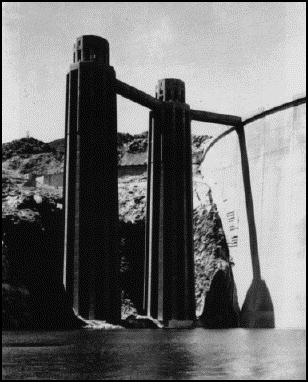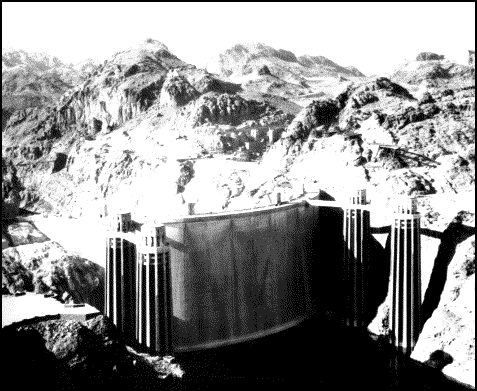For Sale
Our Desperate Battle
Over Water in a World
About to Run Out
Jeffrey Rothfeder
(Tarcher/Putnam)

He even had the gall to go for the tour of Hoover Dam and ask the guides and the visitors if they knew that the very existence of the dam was folly, and that it had wreaked incredible damage on the entire Colorado River Basin:
Much of the Colorado, which now has as many as fifty dams up and down its length, replenishes so weakly that the water downstream is polluted; in many places, it's mostly thick, green and murky, and its oily topping seems to be flowing sideways, not downstream. As a result, the river's once vibrant delta in the Gulf of California has become a barren wedge of desert and salt flats, its biologically rich wetlands a thing of the past.
The response to his question: "Nobody wanted to talk about this issue...Parents held their children closer to them, seemingly to protect them from my questions. The kids weren't listening anyway. And Hoover Dam staffers told me to speak to the press office in Washington, D.C."
One of Rothfeder's grimmest tales has to do with Cochabamba in Bolivia, a city of 500,000 near the Andes. It was there, he tells us, that "globalization faced its first serious challenge, its first physical battle, in a struggle over water." Because the water system was falling apart, the Bolivian government sold it off to Bechtel, the mega-corporation from San Francisco. The first thing that Bechtel did was to jack up the water bill --- almost triple in some cases. For a peasant living on $100 a month, a water bill going from $6 to $17 represents the loss of an intolerably large percentage of income.
There was a general strike; the government sent in the troops; Bechtel refused to back down; some of the strikers were "disappeared;" thousands were injured. The message --- large corporations (including, he notes, the late Enron Corp.), were and are buying up older water companies. Their purpose is to play on the fact that water is a vital necessity; their desire is to turn it into a cash-rich commodity. Those who end up paying through the nose will be the consumers. The middle class will be able to handle a hike in price (they might even own part of the major corporations involved in the hijack); the poor, as usual, will be stuck.
Ironically, many of the most potent ecological lobbying groups welcome the commodification of water. Their reasons: when it gets expensive enough, the very price of it will impose voluntary rationing. If you and I start receiving water bills of $600 - $800 a month, we'll start cutting back on our consumption. The fallacy of this, as Cochabamba proved, is that the very poor will be those who suffer the most.
One expert has found that each person needs at least 50 liters a day to survive. But 2,200,000,000 people in sixty-two countries live on less than that amount. In Haiti and Gambia, people subsist on three liters a day. The author gives us an image that brings home the plight of those who have so little water:
Imagine having less than two large bottles of Poland Spring as your entire water ration for the day.
In Rothfeder's view, the water wars like those in Cochabamba --- and its historical predecessor, the Lake Owens theft --- are just the beginning. Water rights legal battles and questions of water sovereignty are generating sword-rattlings across the globe. The Six-Day War was just such a water fight:
"People generally regard June 5, 1967, as the day the Six Day War began," says Israeli prime minister Ariel Sharon, who was a general in the conflict. "But in reality it started two and a half years earlier, on the day Israel decided to act against the diversion of the Jordan."
There is a looming battle over the Aswan High Dam between Egypt on the one side and Ethiopia and the Sudan on the other. Turkey controls the Tigris and Euphrates, and thus controls the water destinies of Syria, Iraq, Israel, and Jordan (he notes that Suleyman Demirel, the President of Turkey, is a former water engineer). Botswana and Namibia are at loggerheads over the Okavango River. Developers and Native Americans and ecopurists are battling over the Skagit River in Washington. Florida and Alabama are haggling with Georgia over the precious waters of the Chattahoochee.
So far, one of the few success stories is the battle over the Pilcomayo River: Bolivia, Argentina and Paraguay were set to go to war, and only the intervention of Mikhail Gorbachev resolved this South American water war without a shot being fired. (He had learned water arbitration from his early days in the Politburo, allocating water resources from the Syr Dar'ya and Amu Dar'ya rivers among four Russian states.)
